I’m starting this month’s Missive with something different: a game review! I love reading and discussing games and spent several years reviewing video games (though it’s been a while). As a freelance creator in the space, I found myself a bit conflicted on whether or not I want to put down in writing my thoughts on games lest it limit my work opportunities in the future or give folks an overly restrictive view of what kind of games I like, want to create for, etc., but that is the way of the coward so I have decided to dig in and present reviews here from time to time.
Rules of a review: I have to have read the game in its entirety, and I have to have played the game at least once (whether as a player or as a GM)!
Goals of a review: When I come to a game, I want to be intrigued, interested, inspired and other postive i-words. What I don’t want to be is bored or reading essentially the same game I’ve already seen elsewhere. For my reviews, I’ll be highlighting the unique aspects of a game that stand out to me as particularly of note. If I brush over a section or ignore it entirely, it’s because I found it to be standard/typical for the space. I would always rather be left loving or hating a game, instead of just thinking it’s okay.
With that said, let’s dig in.
Lost Truths, Small Powers, and an Expanding Unknown
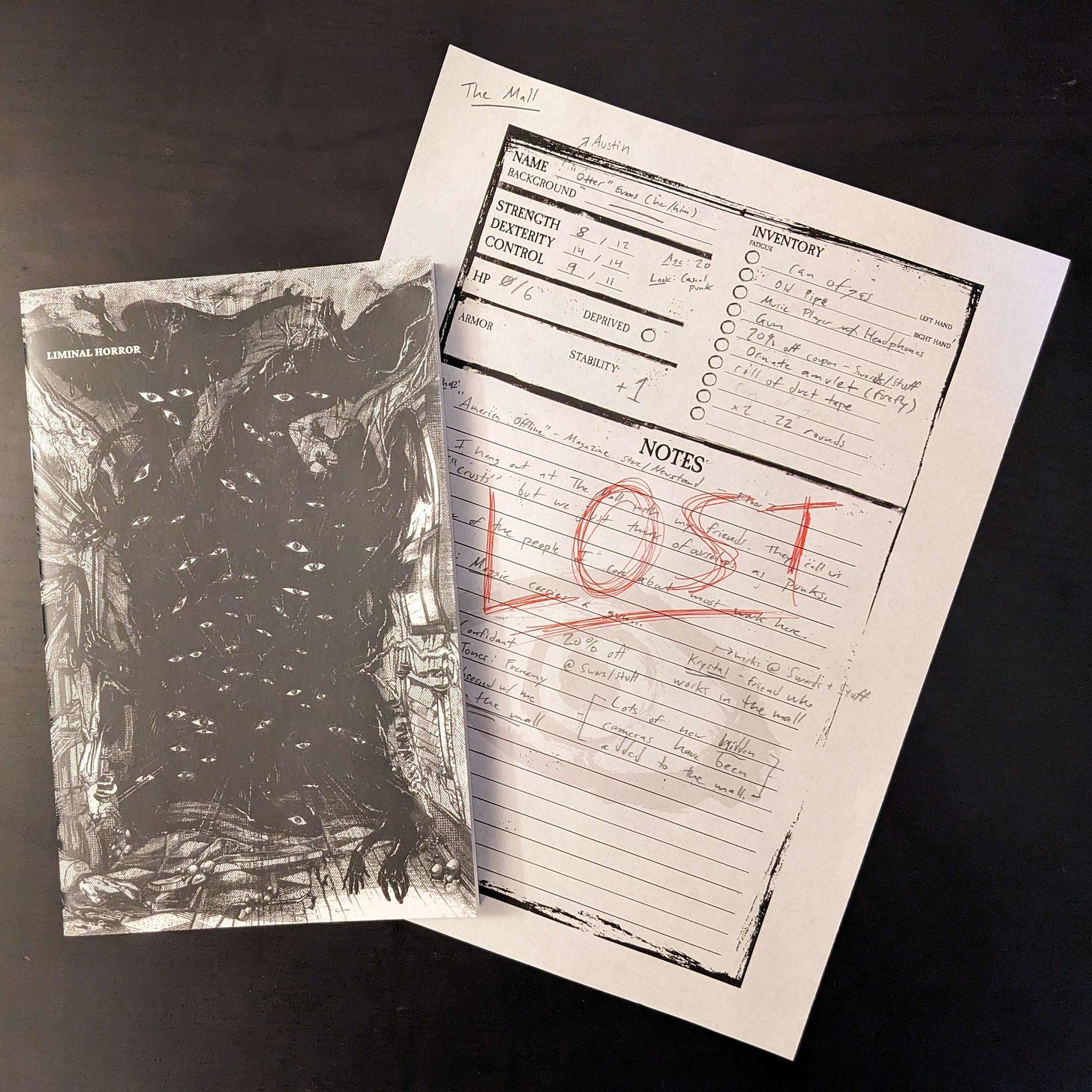
Threshold: There is a pale door with a black handle. It is unremarkable other than the fact that this door can seemingly appear anywhere. Sometimes the door is in places it should not be. Sometimes it stands alone, attached to nothing at all. The one thing you are sure of is that it is the same door each time- one you have not yet been able to open.
- Fallout Table, Entry #11
Liminal Horror is a classless, rules light modern cosmic horror game by Goblin Archives, inspired by Yochai Gal’s Cairn as well as Chris McDowall’s Into The Odd and Ben Milton’s Knave and originally released in 2021. A full web-based version of the game text can be found for free online or in other digital forms on Itch.io. Print copies are available via Exalted Funeral and other indie game retailers.
Liminal Horror opens with a page laying out the game’s core concepts, and it does a good job of highlighting most of the standout aspects of the game.
Facilitator and Player: The game uses a classic GM and player structure with a focus on making rulings during play, presenting engaging situations, and creating an interesting story. Nothing all that new here but it denotes a specific style of facilitated, open play (rather than a more traditional GM-led and solely curated experience).
Player Choice: The big differenciated here, especially among other horror games in the space, is the call out for the Facilitator to always provide players with as much information as possible to help fuel the party’s problem solving. This is not a game of failed Library Use checks and unseen clues (something I frequently encountered in my years with Call of Cthulhu). If you made the choice to research at the Hall of Records, you find the information. If you stopped to scour the room for clues, you find the hidden doorway behind the bookshelf.
Stress and Fallout: This is one of the game’s defining aspects in my mind. Stress mechanics are not new, especially in the horror space, but the shape and structure of Fallout (something you suffer after taking too much Stress) is a stand out reinvention of what is typically used to emulate sanity, trauma or mental illnesses. Here, Fallout acts as a way in which your character is changed, probably forever, by being exposed to the weird truths and old powers of the world, but those changes are often a blend of positive and negative effects that reshape how you approach the world around you, your fellow party members, and the investigation going forward, rather than simply pulling you out of the story by placing you in a sanitarium out of sight of play or in a harmful or stereotypical sort of play acting of actual mental illnesses. See the block quote at the beginning of this review for an example of what Fallout can look like in Liminal Horror.
No Classes: Classless games are nothing new, even in the horror gaming space, but what is presented here is streamlined, easy to understand, and open for a wide variety of character concepts. That said, folks who look for more mechanical depth to their characters may be left wanting. This is a system that relies on you to bring most of your character’s defining features to play rather than them being explicitly marked on your character sheet or represented mechanically with concrete bonuses or abilities. The Hit Protection (used rather than Health) does create a nice ebb and flow of tension and calm required for most horror storytelling to work well and the more your table leads into that “moments of calm > growing dread > terrifying climax > moments of calm > growing dread > terrifying climax” cycle the Hit Protection supports the better.
Growth: Simply put, there is no traditional mechanical growth or advancement for your character. There’s no leveling up or gaining experience points here, but that does not mean you are unable to grow in your abilities or power within the world/story. Many Fallouts offer a change (and often bonus) to one or more of your core ability scores or HP (further incentivizing player’s to send their characters into the dark corners of the earth, but just enough to learn and to be changed but hopefully still survive). Relics and Magic offer ways for a character to wield new power but only after they have sought them out through clever play or thorough investigation. Additionally, most of Liminal Horror’s adventures are set in a modern city or within an open community allowing character’s to cultivate relationships, connections or even join factions/groups in order to raise their standing in the world. Much like the character creation, the game requires the player to set their own goals and create their own advancement within the world.
The Weird: This is another of Liminal Horror’s strongest aspects to me. Fallout, Relics (the game’s magic items essentially), and Magic all act as this game’s closest analog to character advancement and all three of them act to continually open the scope of the weirdness of the world as the characters become more and more exposed to things they once believed to be impossible. Magic especially is something that by its mechanical design here can never be entirely known or fully controlled by the characters. Spells are open to interpretation with the use of a keyword system and they shift into something entirely new every time they are used or with the passage of time. There are strange omens and terrible catastrophes that may come from their use, but they can level the playing field of a dangerous encounter or particularly tough case. The open-to-interpretation nature of the spellcasting itself also gives both players and the facilitator ample room to connect that magic to known entities and powers within the story or to expand the corners of the weird unknown with something totally new. Surely if there’s one forgotten ancient god, then there must be more, right? And if there are more, what else must be out there?
The Old Powers: Powers exist well beyond our understanding and some entities in the world knowingly work for these powers while others are unknowingly a part of a larger plan or cycle as the play characters may be. This is standard cosmic horror stuff and, honestly, since the game does not reinforce these powers or entitites in any mechanical ways (there’s no Cthulhu Mythos-like skill for example), this aspect of the game can easily removed, if desired. To some, I imagine that may be a negative, but to others, it will be a selling point, because it means the system can do more the Old Gods and hidden cultists. I’ve found that in play the Fallout system ensures that the supernatural, the weird, and the unknown are always present in Liminal Horror but you can shape them to be as traditionally cosmic horror or not as you like.
Death: Death is always possible and nearly all threats encountered by the players are truly dangerous, but similarly to the Player Choice bullet from earlier, those dangers and threats should always be known to the player. High stakes are common in horror games, as actions need to have often stark consequences to be frightening, but Liminal Horror does a good job of reminding the Facilitator of the importance of making those threats known to the player. It isn’t scary to be killed out of nowhere. An unknown threat is does not build tension, does not make a character fearful, and certainly does not lead to tough, interesting decisions for the players.
At 36 pages (including a sample investigation), the entire game is quick to read and easy to play. The presentation in this original print run could be flashier or filled with more bespoke art, but it is well presented and acts as a wonderful reference document during play (which is 90% of how a game book is actually used). Plus, I found its somewhat detached voice and clean layout to give the entire book a sense of unease and dread as I read it, like a press release describing a terrible event.
All told, Liminal Horror has become my go-to modern horror game, eclipsing more traditional and complex games like Call of Cthulhu or Delta Green. It eschews the problematic and frankly limiting nature of typical sanity systems for the much more interesting Fallout system. Magic is strange, ever-changing, and ultimately unknowable for the characters even if they may wield it safely for a time. It turns away from the rarely used but catalog-like magic of traditional systems in favor of something just as unusual as its Fallout. The game’s lack of mechanical advancement for characters pushes players to expose themselves to strange magics, experiment with dark artifacts, and to build relationships within the world in order to “level up.”
Beyond that, it’s a system designed to stand out when it is interesting, to provide a tried-and-true framework for the usual moments of risk and uncertainty, and then to fade into the background for everything else. Add Goblin Archive’s committment to providing ample (and often free or easily accessible) expanded rules, guidance, adventures, and more to that mix, and Liminal Horror is a game that it easy to get into and easy to stick with over time.
If the system sounds up your alley and you tend to enjoy my work, I wrote an adventure, Tunnels in White, for it earlier this year. It’s available in print HERE or digitally HERE.
CROWDFUNDING/PRE-ORDER CORNER
Dead Horse #001 - Ends 7/10
The introductory issue to Dead Horse, an anthology of horror and the macabre, that I oversaw a lot of work on as Editor-in-Chief is now available to pre-order. It features the written and artistic works of over thirty creative minds on the topic of “Unsettling Horror.” Dead Horse #001 promises to not only be a useful and exciting addition to your library, but a deep channel of dread to the innermost of your mind.
Pre-ordering gets you a quality, glossy magazine-style print copy as well as a digital copy for free! I’m really proud of how this came together and I’m hoping it will do well enough for us to pursue more issues in the future!
Memory. - Ends 7/5
You awaken on a strange planet with no memory of arriving there. In fact, you have no memories at all. There is only one option: repair the ship and escape. The crew of the Almayer must brave xenocultists, extradimensional abominations, and more to leave the planet. Those brave enough to try will find a number of misfortunes await them, but with enough determination, perhaps they will escape.
I am editing this adventure by Crab Dominion featuring art by Zach Hazard Vaupen and I’m really thrilled with how well it’s done for far, but I’m hoping to get even more people on board before the campaign wraps up soon!
Triangle Agency - Ends 7/6
Triangle Agency, one of my most anticipated upcoming games, has been finding incredible success so far over on Kickstarter. So much so that The Vault, the 12-mission adventure book for the game, has seen a ton of wonderful expansions.
I’m writing one of those adventures, and I’m so excited about having more words, more art, and more design elements to work with as the book has expanded out with several stretch goals. I think both the game and the Vault are going to be really special so I’m encouraging everyone to check it out!
MISSIVE EXCLUSIVE
This month’s freebie is a tease of an upcoming Mork Borg project I’m currently working on: The Lost Remnants of the Lord of Order, a dungeoncrawl adventure in one of the last remaining temples to the long-dead God of Order. It’s an intentional step away from Mork Borg’s typically grimy and chaotic style that’s attempting to show that pure order, law, structure, etc. are equally as unsettling and strange when the entire world is chaos.
The enemies presented here tease some of the elements present in the dungeon. Set damage numbers, unbeatable morale, control and command magic, enemies and players needing to repeat patterns, and more. In the face of typical Mork Borg players, my hope is that these things will seem esoteric and strange at first, but as they focus on learning the Ordered Path, they’ll come to use its rules and requirements for their own gain.
Grab the full-res image, print-ready PDF, and plaintext versions HERE!
Anti-Chaotic Creatures is an independent production by Christian Sorrell and is not affiliated with Ockult Örtmästare Games or Stockholm Kartell. It is published under the MÖRK BORG Third Party License.
MORE COOL STUFF
My very first adventure writing job after going full-time was for Marco at Spicy Tuna was for this BEAUTIFUL looking book that’s finally about to hit Kickstarter! It’s a bunker escape adventure where in order to get out and off world, you’ll first have to go down, deep down, into the dark heart of a corporate black site.
I recently showed off some of the first bespoke art for Tacticians of Ahm! This party (one of each of the core classes) was done by Helena Santana, and I love it! There’s more art on the way too as I continue to build out the book’s first early access layout!
S. Murphy Games recently released their paranormal investigation game Strange Squad, and I did the editing of the rulebook! This is a super easy to pick up and play game with a unique blend of weird characer abilities, time management mechanics, and more. It’s PWYW, and there’s already a full adventure to take it to your table.
I recently got to play some Triangle Agency with The Weekly Scroll gang as part of their two-night crossover event with Liminal Horror, and it was a blast!
All of my paid games and modules are on sale over on Itch until 7/12 as part of their Summer Sale! Take 20% off each individual title or over 30% off a bundle including EVERYTHING.
You’ve reached the end which means you are a true MeatHead (does this work as a nickname for readers of this newsletter? lol)! Good work! - Christian




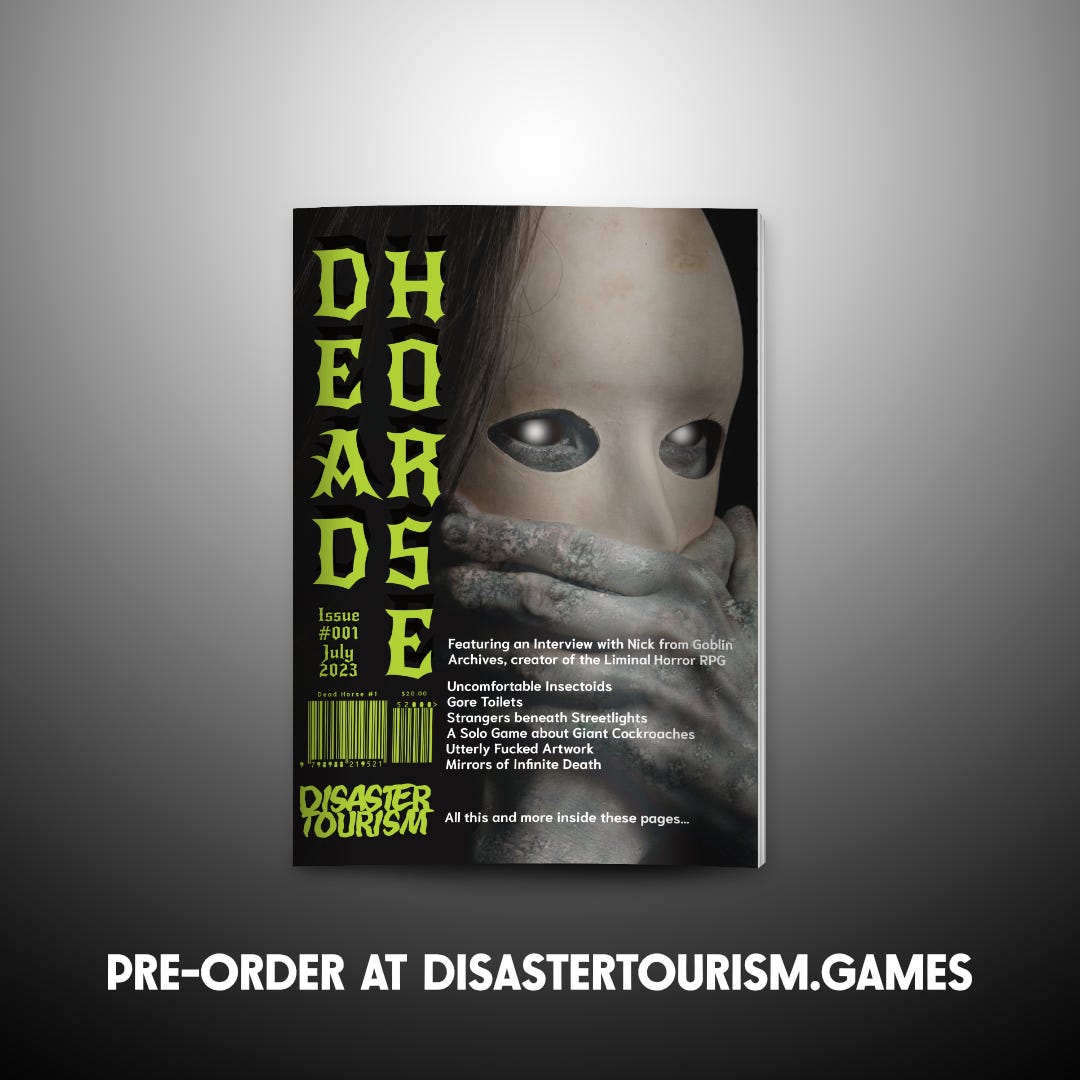



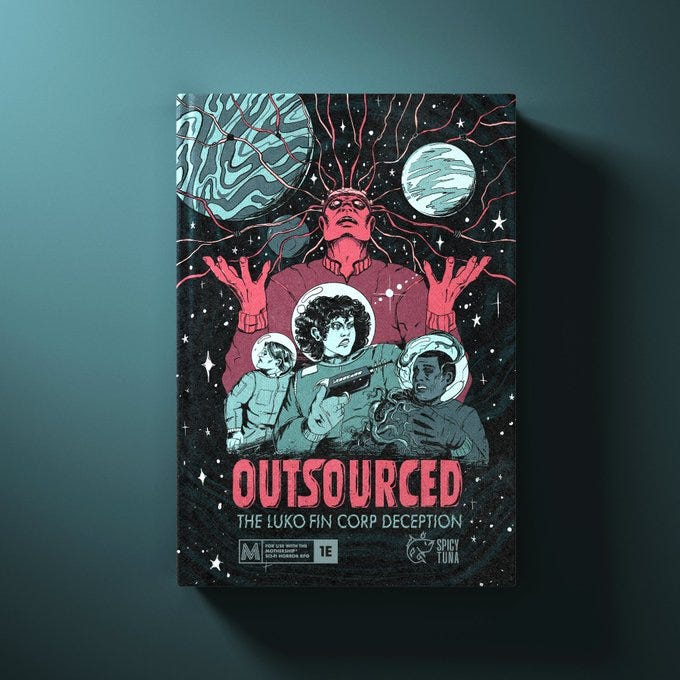
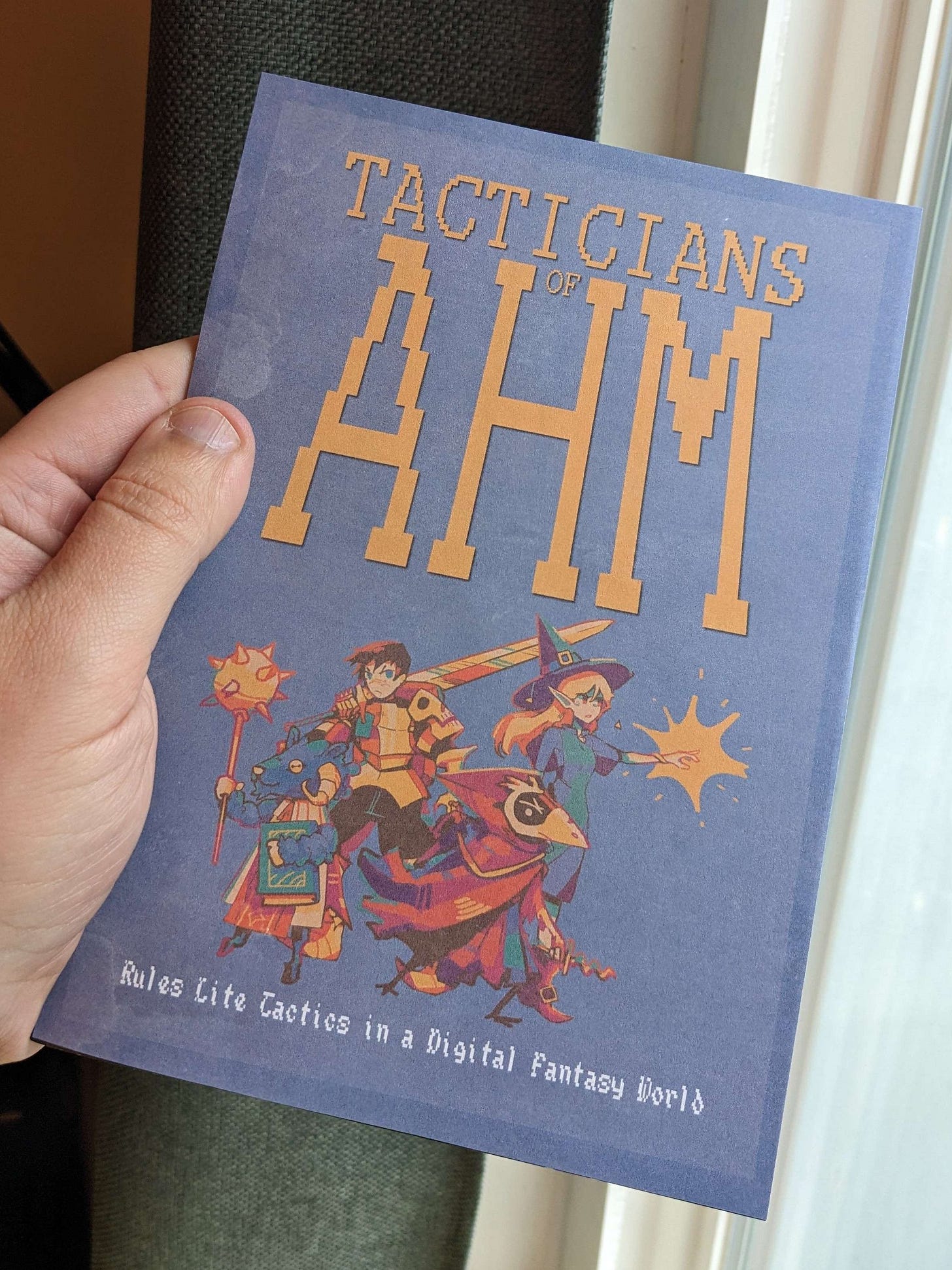
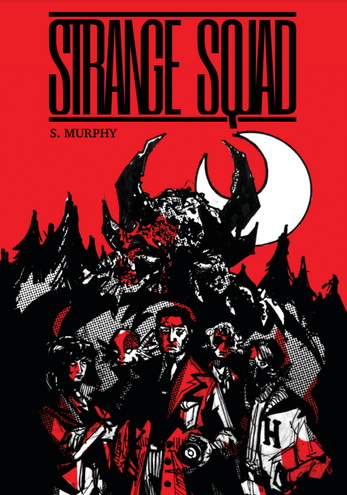

nice review mon fwen
Love seeing the Not Jam font! Super fitting for the freebie!!! Fan of the written review in the newsletter!
Thanks for the shout too.